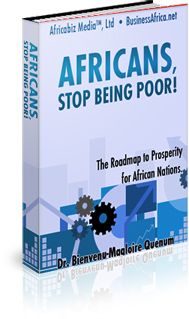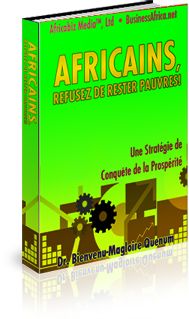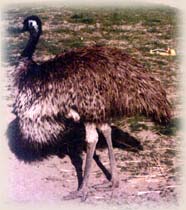|
****JavaScript based drop down DHTML menu generated by NavStudio. (OpenCube Inc. - http://www.opencube.com)****



|
| ! |
| AFRICABIZ
VOL 1 - ISSUE: 73
MAY
15 - JUNE 14, 2005
Previous
Issue
Editor: Dr. Bienvenu-Magloire Quenum
editor@africabiz.org
| |
A
WORD FROM THE EDITOR
| | |
|
Dear visitor and international investor,
We
warmly welcome you, if this is
your first visit to Africabiz
Online - The ultimate newsletter
on trading and investing in 49
sub-Saharan African countries.
If you are a regular and faithful
reader, welcome back.
-
ANOTHER ROTTEN FURUNCLE IN WEST AFRICA
Since the date of the publication (February 15th, 2005) of an article titled Enough Is Enough. The Right To Interfere that dealt with the political situation in the Republic of Togo, events sped up and Faure Ayadema had been declared the winner of the presidential ballot held on April 24, 2005.
The opposition, backed by non-governmental organizations and the reserves expressed by some G-7 countries (The United States of America in particular), claimed the vote was rigged. In fact, there have been ubuesque scenes of military seizing polling boxes at polling stations and running away with them to unknown destination - that had been reported and broadcast by the media.
In consequence opposition militants took to the streets of the southern part of the country and according to the opposition's counting at least one hundred of people died during the riots and several hundred had been badly wounded.
In spite of the flagrant vote rigging that took place, Ecowas and the international community "recognized" the results released by the interim Togolese government that declared Faure Eyadema the winner with about 60% of the votes against the contender Bob Aketani who was "allocated" 38%.
It seems that Ecowas' heads of states do not want Togo to become another country caught in the wild fire of civil wars that had already engulfed Liberia, Sierra Leone and Ivory Coast (Click here for countries' briefs). The surrounding (Niger, Burkina Faso, and Mali) landlocked countries's leaders think that Faure Eyadema is the only one capable of preserving calm, civil peace and security in Togo. They want to continue using the port of Lome that became the transit harbor for import and export of goods to the hinterland in replacement of the port of Abidjan, Ivory Coast, that is less safe since the start, in September 2002, of Ivory Coast's political crisis.
Would they succeed in their bid to preserve peace and security in Togo under the leadership of Faure Eyadema? The near future shall tell if the opposition parties would keep quite and put.
One thing is sure: the circumstances that preside to the takeover of power by the son of the deceased president Eyadema will not improve the persisting atmosphere of defiance, suspicion and mistrust existing since 1991 between opposition parties and the government.
Would Faure Eyadema succeed forming a national unity government? In case he does succeed would the people accepting to join be representative of the opposition and therefore capable of calming down the restive opposition's militants? Would he succeeds convincing the European Union to resume aids program to Togo? Would Germany forgive the fact that masked men, clad in black set fire to Lome's Goethe Institute destroying more that 8,000 books, computers and furniture?
Let us wait and see. If Faure Eyadema succeeds improving the economic situation he may stay in power for a long time. Otherwise, the bid of Ecowas' heads of States is lost.
In our opinion, Togo is another rotten furuncle - like Ivory Coast - on the West African political stage that would soon or latter burst over if the "new regime" tries to use military and security forces to curb the opposition - as the late Eyadema did for three decades running.
In the article titled Enough Is Enough. The Right To Interfere that dealt with the political situation in the Republic of Togo, the following was stated: "Early prevention will cost less than late humanitarian interventions, to assist millions of refugees fleeing their home, because of civil wars resulting from catastrophic political and economic situations created by bad rulers' governance practices." Let us hope that Togo would not rejoin the "inferno" as did Liberia, Sierra leone and Ivory Coast.
A wiser attitude (from the international community) would have been to impose to Togo's ruling political circles a national unity government that would be in charge of fair and transparent elections within a span time of two to three years.
- DO AFRICAN COUNTRIES HAVE A CHOICE?
Since mid 1980's most African countries have been submitted to Structural Adjustment Programs (SAP), which aims were to stop the economic decline, boost the economy and fight against rampant poverty.
Till now, in 2005, none of the aims had been achieved. Sub-Saharan African countries are still as poor as before the inception of SAP - most of the population, up to 60% in some countries, living with less than one US$ a day. Therefore, SAP' sponsors, the IMF and the World Bank, initiated additional programs called Poverty Reduction Programs that put emphasis on Education and Health. They provide funds to assist develop Education and Health with the hope that the improvement of the situation in said economic areas would help alleviate poverty.
One can predict that no improvement would occur under PRP before at least two decades - if ever! Because, first, two decades would be necessary for PRP to have eventually an impact on the economy; and, second, Education and Health are not "immediate" driving force for the economy - in African countries. In the contrary, they both spend huge amount (up to 70%) of national budget revenues provided by other economic sectors such as Agriculture, Industries and Services.
Thus, as far as Agriculture, Industries and Services would not be developed simultaneously within the framework of an integrated developing scheme such as the one here available the result would be the same as for SAP. That is to say, there will be no increase in the per capita GNP of African nations; and consequently no poverty reduction would occur.
SAP and PRP had been more or less imposed to African rulers by the IMF and the World Bank. African rulers are presented with a "take it or leave it" choice. Implicitly, they are flatly told that "There Is No Alternative - T.I.N.A." On their part, African rulers, till now, had not bargain enough or made counter economic developing proposals that could help better use the assistance provided by the IMF and the World Bank to develop the economy.
Are African countries really obliged to "take it or leave it"? Do they really do not have alternatives to the proposals put forward by the IMF and the World Bank?
Click
here to read more about Should African Countries Surrender For Ever To T.I.N.A.?
-
Contributor's Guidelines
are here to review. Your
contribution on "How emerging nations
and particularly African countries
/ entrepreneurs could bridge the developing
gap" is
welcome.
| Your
feedback / objection / contribution is welcome. Visit WorldWide
BizCenter,
and choose General
Information (as topic) to
create a thread for discussion. On the top of the WorldWide BizCenter page,
there is a HELP link to assist you making an efficient
use of the discussion board. This
link also is useful |
You need to register to vote if an article has a voting
booth attached. In other words, you cannot cast vote about an article is you are
not registered.
Many thanks for dropping by and see you here on June 15, 2005.
Dr.
B.M. Quenum
Editor
of AFRICABIZ
 | | |
| BUSINESS
OPPORTUNITIES IN AFRICA
| |
-
Several business opportunities - component parts of the Integrated Developing Scheme described in Africans, Stop Being Poor! are listed in following table.
| a-
SHEA BUTTER (5,
6, 7,
11, 12,
13)
b- BLUE GOLD (14,
15, 16,
17, 18,
19)
c- FREEZE-DRIED PAPAIN (20,
21, 22
and here)
d-
KENAF (23,
24)
e- VEGETABLE OIL (25,
26, 27,
28)
f- CEREALS (30,
31, 32,
33)
g- FRUITS (34,
35, 36,
37, 38,
39, 40,
42, 43,
44, 45,
46)
h- ESSENTIAL OILS (47,
48, 49,
50, 51,
52)
i- ROOTS & TUBERS (54,
55, 56,
57, 58,
59, 60,
61, 62,
63, 64)
j-
FOWL BREEDING (66,
67, 68,
69, 70,
71, 72,
73, 74 |
-
FOWL BREEDING AS BUSINESS OPPORTUNITY: PART
X - INTRODUCTION TO THE BREEDI NG OF RATITES AS ALTERNATIVE TO CLASSIC LIVESTOCK: B - INTRODUCTION TO THE EMU
Several deliveries listed above in the yellow caption, under Fowl Breeding up to issue N° 72, discussed about the many aspects of breeding "classic" fowl such as poultry, duck and pentad. Conclusion had been reached there are opportunities
throughout the continent to establish chicken breeding companies to cater for
national demands in spite of the unfair
competition exercised by import from Europe, provided that operators strictly control costs of production.
Starting from this issue N° 73, another kind of fowl is discussed that is different from the ones considered in previous issues. They are called Ratites and have the particularity to run. They are not flying bird. They run and run fast. Ratites are represented by two families: the Ostrich
and the Emu that produce flesh similar to four legs' animals.
Let us consider for this issue the Emu, which contrary to the Ostrich, is not an African native bird. However it is possible to breed it in African tropical conditions. The emu industry is in its infancy and now is the time to become involved.
- INTRODUCTION TO THE EMU
 Emus are native to Australia.
The color of feathers of the wild beast is brownish as shown on the figure at the left side of this paragraph. The female begins to breed between 18 months and three years of age, and may continue to produce eggs for more than 15 years. The male is the one in charge of incubating the eggs, which hatch in about 50 days. Emus are native to Australia.
The color of feathers of the wild beast is brownish as shown on the figure at the left side of this paragraph. The female begins to breed between 18 months and three years of age, and may continue to produce eggs for more than 15 years. The male is the one in charge of incubating the eggs, which hatch in about 50 days.
The emu grows to full size within two years standing five to six feet tall (1.6 -1.9 meter when standing erect), and weighing as much as 150 pounds (68 kg). It has powerful legs similar to the ostrich, it can run up to 40 mph (64,37 km / hour).
An emu lives about 30 years. Their calls consist of booming, drumming and grunting. Booming is created in an inflatable neck sac, and can be heard up to 2km away. Visit following website for a series of emu's pictures
The emu breeding industry is gathering momentum and is poised to become a substantial domestic and export earner for countries that would enter the fray.
For the past decade, the industry has gone through the high-priced breeding cycle linked to the lengthy maturity period (18 months) necessary for the female emu to start laying eggs. However, it is currently breaking into the commercial market with secure knowledge in husbandry and product development.
This means that new comers will not have to support the capital losses incurred by the pioneers in the trial and error phase of husbandry; and will not have to wait for products to be refined and developed as they are readily available and in place. They will find stock purchasing prices attractive.
- EMU'S PRODUCTS
Emu farming has opened a potential products' range that will sell well on the international marketplace over the next decade. These products include leather, meat, feather, decorative egg shells and emu oil. The oil in particular has great profit potential. It is used, as it is, as a cosmetic or as ingredient for cosmetic and pharmaceutical's preparations. The oil is an aid to arthritis treatment and a relief for all types of muscle and joint pain; as well as a treatment for burn pain and scarring.
Further, the emu's oil possesses extraordinary anti-aging elements that are currently under study with results to date increasingly attracting serious interest from the cosmetic industry. Source: http://www.tagalder.com/emu.php
As for poultry, young stock may be bred for resale, and eggs sold for hatching. Emu meat, like ostrich meat, is similar in texture and color to beef. Compared to beef, it has more iron, protein, and vitamin C. The low fat meat has less sodium than beef, chicken, or turkey. There are huge potential in preparing the meat to target African market: smoked and sun died meat for instance.
- THE ADVANTAGES OF BREEDING EMU VERSUS CLASSIC LIVESTOCK
The emu is a relatively simple animal to farm and easy to manage. The interest and investments in this exciting new industry are largely due to the products above briefly outlined and advantages discussed below:
1- It adapts to almost any climatic condition; but prosper better in tropical ones.
2- It has a high resistance to disease.
3- It integrates well with other farming operations, i.e. horses, cattle, sheep, etc.
4- It requires very little ground space compared to other livestock, (15 acres easily accommodates up to 600 birds).
5- It efficiently converts feed to meat yielding 28-30 lb. of premium meat at a processing age of one-year-old.
6- It consumes fruits, flowers, insects, seeds and green vegetation; love caterpillars. Ingest
large stones into its gizzard to aid the grinding process. It needs a daily intake of water. Total feed intake to reach commercial size of 28-30 lb. is around US$ 85 per year - to producing all the categories of products above briefly listed; plus a red meat of excellent health quality.
7- There is a worldwide demand for breeding stock, meat, oil, leather, feathers and other by-products. Smoked and sun dried emu meat have a ready huge market in African countries. |
The breeding of Emu is a capitalistic business in comparison to poultry, pentad and duck breeding in the sense that the purchase of initial stock of birds cost more money. However, it demand less investment compared to classic livestock breeding.
In conclusion, one can say the breeding of emu is a tremendous business opportunity for the clever investor who wants to enter the traditional lucrative red meat industry's business; and market several additional by-products that could yield substantial benefits. Next delivery (Issue 75) will partly deal partly with Emu's by--products in addition to red-meat.
| MORE
ON FOWL BREEDING | 1-
Poultry
Breeding and Genetics
by R.D. Crawford
2- The
Dollar Hen: The Classic Guide to American Free-Range Farming
by Milo M.
Hastingd, Robert Plamondon
3- Small-Scale
Poultry-Keeping: A Guide To Free-Range Poultry Production
by Ray Feltwell
4- The
Encyclopedia of Farm Animal Nutrition
by M.F. Fuller, et al
5-
The
Mating and Breeding of Poultry
by Harry M. Lamon, Rob R. Slocum
6-
Modern
Livestock and Poultry Production
by James R. Gillespie
|
7- Success
With Baby Chicks: A Complete Guide to Hatchery Selection
by Robert Plamondon
8- The
Classic Guide To Poultry Nutrition:
Chickens, Turkeys, Ducks, Geese, Gamebirds,
and Pigeons
by Gustave F. Hauser
9- The
Strange History of The Ostrich
In Fashion, Food and Fortune
by Rob
Nixon
10- Ostrich's
Avian Incubation: Behaviour, Environment and Evolution
by D. Charles Deeming |
Adobe
Acrobat Reader is available here
- Interested parties - private African and international investors /
companies, government
agencies,
international development
agencies - to make contact through the Free Access Support Console available at this link
Contact through the support console will get quickest reply from Africabiz Online's staff, than contact by emails. Click here for contact information. Be advised that first contact should be through the support console to be followed by phone calls. If you are a VIP-Member, use VIP-Members Support Console available here.
Before you consult please click
here to review this clarification | |

